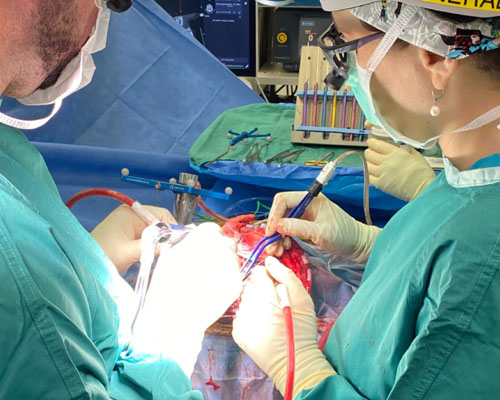Brain Tumor Surgery - By Dr. Pravin Ganjre
Dr. Pravin Ganjare is well-known Brain Surgeon in Pune. He provides state-of-the-art treatment for brain surgery and has vast experience in this field. Currently, he works as a Neurosurgeon at Rubyhall Clinic, Pune, Maharashtra, India. He has wide experience working in various fields of Neurosurgery like Brain Trauma, Spine Trauma, Pediatric Neurosurgery, Brain and Spine Tumors Surgeries . for Back Pain etc.

Brain Tumor Surgery - By Dr. Pravin Ganjre
Brain surgery involves different procedures to repair the structural problems of the brain. Different types of brain surgeries are performed depending on the affected area and condition of the brain. Advanced technologies in the medical field allow brain surgeons to operate on any portion of the brain without an incision in or near the head.
Brain surgery is one of the most specialized and delicate branches in the field of medicine. Due to the of advances in the instrumentation and better-developed infrastructure, it is quite safe and has excellent results. These surgical procedures are no more prolong operations and now we have far better anaesthetic agents available. Brain tumour means growth in the Brain or in the cranial compartment. These tumours can be completely excised. These tumours can occur in any part of the Brain and surgeon can reach to all these tumours for its excision.
The blood clots can occur in the Brain and it requires immediate removal or evacuation by surgery which can be done on an emergency basis. The water content in the Brain can increase because of various reasons and shunt procedures are routinely done to overcome this problem especially in children. Some children are born with abnormalities of head and Brain, there are many corrective procedures which are necessary at that early age for a child’s normal growth.
The stereotactic procedures now are routinely performed, especially for small lesions of the Brain. The incision is very small and sometimes these procedures are done under local anaesthesia. In the case of head injuries, surgery is needed if there is a fractured skull, blood clot in and around the brain. Recovery from anaesthesia is almost immediate, patients can eat and drink within a few hours after surgery. After brain surgery, the person needs a short stay in the hospital and within a few weeks can resume his /her job.
Treatment of Brain Tumour :
Surgery is the first and most common treatment for most patients with brain tumors. It is highly successful for most benign tumors. Surgery is usually the best treatment for tumors that neurosurgeons can reach without severely damaging normal brain tissue near the tumor.
Neurosurgeons can surgically remove some tumors completely (called resection or complete removal). If the tumor is near sensitive areas of the brain, neurosurgeons will only be able to remove part of it (called partial removal). Even partial removal can relieve symptoms and facilitate or increase the effectiveness of other treatments.
A biopsy is a surgical procedure to remove a small sample of a brain tumor for examination under a microscope — is usually performed during surgery to remove the tumor. This enables doctors to confirm the diagnosis and recommend the most appropriate treatment. If the patient is not a surgical candidate, a separate biopsy may be done.
The role of surgery in treating brain tumours
Surgery can provide:
The complete removal of some brain tumors
• A sample to enable doctors to diagnosis the tumor and recommend the most appropriate treatment
• Better quality of life:
– Reduced symptoms and improved ability to function (e.g., to think, speak or see better)
– Less pressure within the skull from the tumor
• A longer life
Types of Brain Tumour Surgery
Surgery is one type of treatment for brain tumors. The most common types of surgery are:
• Biopsy
• Craniotomy
• Extended bifrontal craniotomy
• “Eyebrow” craniotomy (supra-orbital craniotomy)
• “Keyhole” craniotomy (retro-sigmoid craniotomy)
• Orbitozygomatic craniotomy
• Translabyrinthine craniotomy
• Endonasal endoscopy (endonasal endoscopic surgery)
• Neuroendoscopy
Brain Tumor Surgery - By Dr. Pravin Ganjre
Brain tumor treatment depends on a number of factors, including the type, location, size, and grade of the tumor, as well as the age and health of the patient. Your doctor can present your treatment options and tell you what to expect from each one.
Specialists who treat brain tumors include neurosurgeons, neuro-oncologists, medical oncologists, and radiation oncologists. In addition to the specialist, your treatment team may include other professionals such as a nurse, dietitian, mental health counselor, social worker, physical therapist, occupational therapist, and/or speech therapist. Dr. Pravin Ganjre provides the best Brain Tumor Treatment in Pune.

